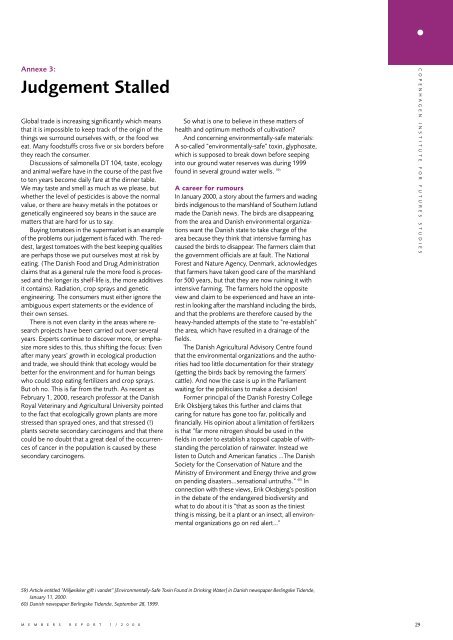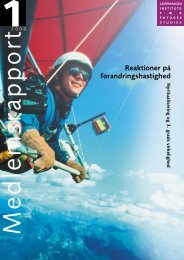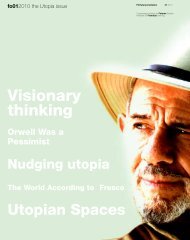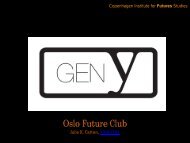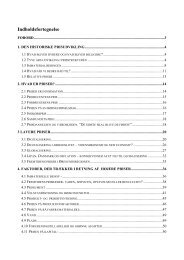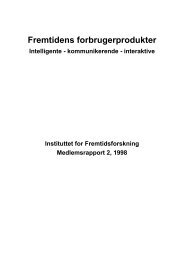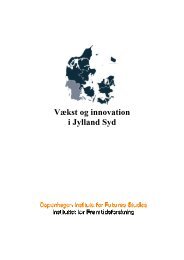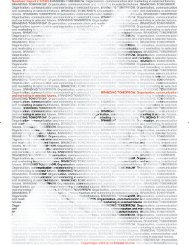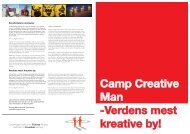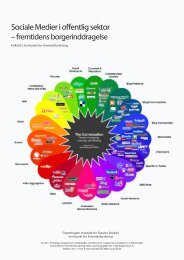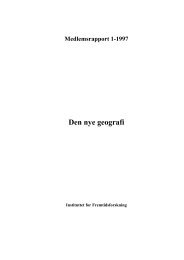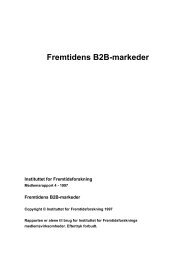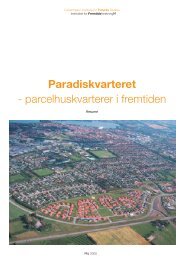Reactions to the Pace of Change
Reactions to the Pace of Change
Reactions to the Pace of Change
You also want an ePaper? Increase the reach of your titles
YUMPU automatically turns print PDFs into web optimized ePapers that Google loves.
Annexe 3:Judgement StalledGlobal trade is increasing significantly which meansthat it is impossible <strong>to</strong> keep track <strong>of</strong> <strong>the</strong> origin <strong>of</strong> <strong>the</strong>things we surround ourselves with, or <strong>the</strong> food weeat. Many foodstuffs cross five or six borders before<strong>the</strong>y reach <strong>the</strong> consumer.Discussions <strong>of</strong> salmonella DT 104, taste, ecologyand animal welfare have in <strong>the</strong> course <strong>of</strong> <strong>the</strong> past five<strong>to</strong> ten years become daily fare at <strong>the</strong> dinner table.We may taste and smell as much as we please, butwhe<strong>the</strong>r <strong>the</strong> level <strong>of</strong> pesticides is above <strong>the</strong> normalvalue, or <strong>the</strong>re are heavy metals in <strong>the</strong> pota<strong>to</strong>es orgenetically engineered soy beans in <strong>the</strong> sauce arematters that are hard for us <strong>to</strong> say.Buying <strong>to</strong>ma<strong>to</strong>es in <strong>the</strong> supermarket is an example<strong>of</strong> <strong>the</strong> problems our judgement is faced with. The reddest,largest <strong>to</strong>ma<strong>to</strong>es with <strong>the</strong> best keeping qualitiesare perhaps those we put ourselves most at risk byeating. (The Danish Food and Drug Administrationclaims that as a general rule <strong>the</strong> more food is processedand <strong>the</strong> longer its shelf-life is, <strong>the</strong> more additivesit contains). Radiation, crop sprays and geneticengineering. The consumers must ei<strong>the</strong>r ignore <strong>the</strong>ambiguous expert statements or <strong>the</strong> evidence <strong>of</strong><strong>the</strong>ir own senses.There is not even clarity in <strong>the</strong> areas where researchprojects have been carried out over severalyears. Experts continue <strong>to</strong> discover more, or emphasizemore sides <strong>to</strong> this, thus shifting <strong>the</strong> focus: Evenafter many years’ growth in ecological productionand trade, we should think that ecology would bebetter for <strong>the</strong> environment and for human beingswho could s<strong>to</strong>p eating fertilizers and crop sprays.But oh no. This is far from <strong>the</strong> truth. As recent asFebruary 1, 2000, research pr<strong>of</strong>essor at <strong>the</strong> DanishRoyal Veterinary and Agricultural University pointed<strong>to</strong> <strong>the</strong> fact that ecologically grown plants are morestressed than sprayed ones, and that stressed (!)plants secrete secondary carcinogens and that <strong>the</strong>recould be no doubt that a great deal <strong>of</strong> <strong>the</strong> occurrences<strong>of</strong> cancer in <strong>the</strong> population is caused by <strong>the</strong>sesecondary carcinogens.So what is one <strong>to</strong> believe in <strong>the</strong>se matters <strong>of</strong>health and optimum methods <strong>of</strong> cultivation?And concerning environmentally-safe materials:A so-called “environmentally-safe” <strong>to</strong>xin, glyphosate,which is supposed <strong>to</strong> break down before seepingin<strong>to</strong> our ground water reserves was during 1999found in several ground water wells. 59)A career for rumoursIn January 2000, a s<strong>to</strong>ry about <strong>the</strong> farmers and wadingbirds indigenous <strong>to</strong> <strong>the</strong> marshland <strong>of</strong> Sou<strong>the</strong>rn Jutlandmade <strong>the</strong> Danish news. The birds are disappearingfrom <strong>the</strong> area and Danish environmental organizationswant <strong>the</strong> Danish state <strong>to</strong> take charge <strong>of</strong> <strong>the</strong>area because <strong>the</strong>y think that intensive farming hascaused <strong>the</strong> birds <strong>to</strong> disappear. The farmers claim that<strong>the</strong> government <strong>of</strong>ficials are at fault. The NationalForest and Nature Agency, Denmark, acknowledgesthat farmers have taken good care <strong>of</strong> <strong>the</strong> marshlandfor 500 years, but that <strong>the</strong>y are now ruining it withintensive farming. The farmers hold <strong>the</strong> oppositeview and claim <strong>to</strong> be experienced and have an interestin looking after <strong>the</strong> marshland including <strong>the</strong> birds,and that <strong>the</strong> problems are <strong>the</strong>refore caused by <strong>the</strong>heavy-handed attempts <strong>of</strong> <strong>the</strong> state <strong>to</strong> “re-establish”<strong>the</strong> area, which have resulted in a drainage <strong>of</strong> <strong>the</strong>fields.The Danish Agricultural Advisory Centre foundthat <strong>the</strong> environmental organizations and <strong>the</strong> authoritieshad <strong>to</strong>o little documentation for <strong>the</strong>ir strategy(getting <strong>the</strong> birds back by removing <strong>the</strong> farmers’cattle). And now <strong>the</strong> case is up in <strong>the</strong> Parliamentwaiting for <strong>the</strong> politicians <strong>to</strong> make a decision!Former principal <strong>of</strong> <strong>the</strong> Danish Forestry CollegeErik Oksbjerg takes this fur<strong>the</strong>r and claims thatcaring for nature has gone <strong>to</strong>o far, politically andfinancially. His opinion about a limitation <strong>of</strong> fertilizersis that “far more nitrogen should be used in <strong>the</strong>fields in order <strong>to</strong> establish a <strong>to</strong>psoil capable <strong>of</strong> withstanding<strong>the</strong> percolation <strong>of</strong> rainwater. Instead welisten <strong>to</strong> Dutch and American fanatics …The DanishSociety for <strong>the</strong> Conservation <strong>of</strong> Nature and <strong>the</strong>Ministry <strong>of</strong> Environment and Energy thrive and growon pending disasters…sensational untruths.” 60) Inconnection with <strong>the</strong>se views, Erik Oksbjerg’s positionin <strong>the</strong> debate <strong>of</strong> <strong>the</strong> endangered biodiversity andwhat <strong>to</strong> do about it is “that as soon as <strong>the</strong> tiniestthing is missing, be it a plant or an insect, all environmentalorganizations go on red alert…”C O P E N H A G E N I N S T I T U T E F O R F U T U R E S S T U D I E S59) Article entitled “Miljøsikker gift i vandet” [Environmentally-Safe Toxin Found in Drinking Water] in Danish newspaper Berlingske Tidende,January 11, 2000.60) Danish newspaper Berlingske Tidende, September 28, 1999.M E M B E R S R E P O R T 1 / 2 0 0 029


